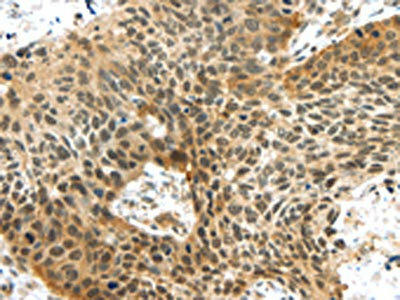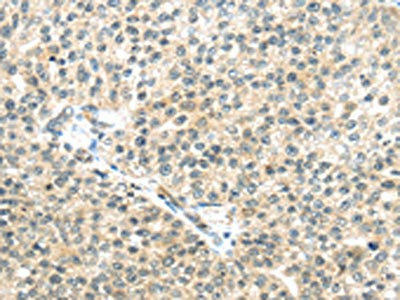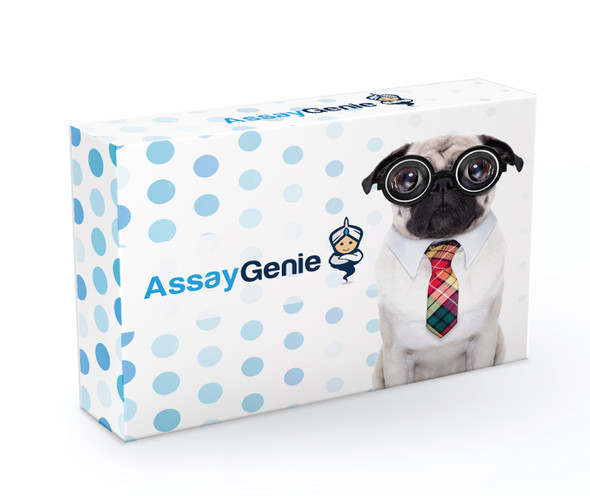Description
| Antibody Name: | TTBK2 Antibody (PACO20784) |
| Antibody SKU: | PACO20784 |
| Size: | 50ul |
| Host Species: | Rabbit |
| Tested Applications: | ELISA, IHC |
| Recommended Dilutions: | ELISA:1:2000-1:10000, IHC:1:30-1:150 |
| Species Reactivity: | Human, Mouse |
| Immunogen: | Synthetic peptide of human TTBK2 |
| Form: | Liquid |
| Storage Buffer: | -20°C, pH7.4 PBS, 0.05% NaN3, 40% Glycerol |
| Purification Method: | Antigen affinity purification |
| Clonality: | Polyclonal |
| Isotype: | IgG |
| Conjugate: | Non-conjugated |
 | The image on the left is immunohistochemistry of paraffin-embedded Human esophagus cancer tissue using PACO20784(TTBK2 Antibody) at dilution 1/45, on the right is treated with synthetic peptide. (Original magnification: x200). |
 | The image on the left is immunohistochemistry of paraffin-embedded Human breast cancer tissue using PACO20784(TTBK2 Antibody) at dilution 1/45, on the right is treated with synthetic peptide. (Original magnification: x200). |
| Background: | This gene encodes a serine-threonine kinase that putatively phosphorylates tau and tubulin proteins. Mutations in this gene cause spinocerebellar ataxia type 11 (SCA11); a neurodegenerative disease characterized by progressive ataxia and atrophy of the cerebellum and brainstem. |
| Synonyms: | tau tubulin kinase 2 |
| UniProt Protein Function: | TTBK2: Serine/threonine kinase which is able to phosphorylate tau on serines. Defects in TTBK2 are the cause of spinocerebellar ataxia type 11 (SCA11). Spinocerebellar ataxia is a clinically and genetically heterogeneous group of cerebellar disorders. Patients show progressive incoordination of gait and often poor coordination of hands, speech and eye movements, due to degeneration of the cerebellum with variable involvement of the brainstem and spinal cord. SCA11 is an autosomal dominant cerebellar ataxia (ADCA). It is a relatively benign, late-onset, slowly progressive neurologic disorder. Belongs to the protein kinase superfamily. CK1 Ser/Thr protein kinase family. 3 isoforms of the human protein are produced by alternative splicing. |
| UniProt Protein Details: | Protein type:EC 2.7.11.1; Protein kinase, Ser/Thr (non-receptor); Protein kinase, CK1; Kinase, protein; CK1 group; TTBK family Chromosomal Location of Human Ortholog: 15q15.2 Cellular Component: centriole; extracellular space; nucleus; cytosol Molecular Function:protein serine/threonine kinase activity; protein binding; ATP binding Biological Process: regulation of cell shape; smoothened signaling pathway; peptidyl-serine phosphorylation; organelle organization and biogenesis; cilium biogenesis Disease: Spinocerebellar Ataxia 11 |
| NCBI Summary: | This gene encodes a serine-threonine kinase that putatively phosphorylates tau and tubulin proteins. Mutations in this gene cause spinocerebellar ataxia type 11 (SCA11); a neurodegenerative disease characterized by progressive ataxia and atrophy of the cerebellum and brainstem. [provided by RefSeq, Aug 2009] |
| UniProt Code: | Q6IQ55 |
| NCBI GenInfo Identifier: | 116242833 |
| NCBI Gene ID: | 146057 |
| NCBI Accession: | Q6IQ55.2 |
| UniProt Secondary Accession: | Q6IQ55,O94932, Q6ZN52, Q8IVV1, |
| UniProt Related Accession: | Q6IQ55 |
| Molecular Weight: | 1244 |
| NCBI Full Name: | Tau-tubulin kinase 2 |
| NCBI Synonym Full Names: | tau tubulin kinase 2 |
| NCBI Official Symbol: | TTBK2 |
| NCBI Official Synonym Symbols: | TTBK; SCA11 |
| NCBI Protein Information: | tau-tubulin kinase 2 |
| UniProt Protein Name: | Tau-tubulin kinase 2 |
| Protein Family: | Tau-tubulin kinase |
| UniProt Gene Name: | TTBK2 |
| UniProt Entry Name: | TTBK2_HUMAN |






